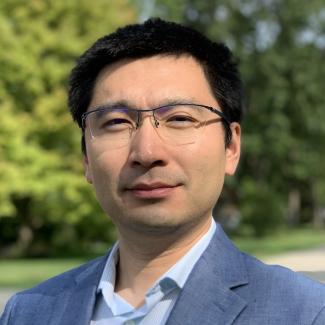Event
Physical Chemistry Seminar: Dr. Zhenfei Liu, Wayne State University
"Understanding energy conversion at heterogeneous interfaces from many-body perturbation theory"

Abstract:
Heterogeneous interfaces, especially those formed between molecules and solid-state substrates, are ubiquitous in nanoscale functional materials and energy related applications. Characterization of the electronic structure and optical properties at these interfaces is crucial for understanding charge transfer dynamics and energy conversion mechanisms. Many-body perturbation theory, such as the GW-BSE formalism (G: Greens function; W: screened Coulomb interaction; BSE: Bethe-Salpeter equation), provides a formal theoretical framework for predicting band energy level alignments and optical properties, but the computational cost for typical interfaces is high. Here, I will introduce new methodological advancements for accelerating many-body calculations of large heterogeneous interfaces based on the idea of dielectric embedding. Furthermore, I will show applications to systems of experimental importance for insights into structure-property relationships, including covalent organic frameworks adsorbed on metal substrates and (metallo)phthalocyanine molecules adsorbed on transition-metal dichalcogenides. Lastly, I will discuss our recent work on the characterization of quantum dot assemblies and relevant interfaces.
Bio-Sketch: Zhenfei got his B.S. in chemistry from Peking University in China in 2007. He then worked with Professor Kieron Burke in University of California, Irvine for his Ph.D. in theoretical chemistry between 2007 and 2012. After that, he worked with Professor Jeffrey Neaton as a postdoc in Lawrence Berkeley National Laboratory and University of California, Berkeley. He joined Wayne State University in 2018 as an assistant professor in the Department of Chemistry. He received the Ralph E. Powe Junior Faculty Enhancement Award from Oak Ridge Associated Universities in 2020, and an NSF CAREER Award in 2021.
Website: https://liugroupwsu.weebly.com/
Two Papers:
- J. Chem. Phys. 152, 054103 (2020). https://aip.scitation.org/doi/10.1063/1.5140972
- J. Chem. Phys. 155, 214702 (2021). https://aip.scitation.org/doi/10.1063/5.0072995
Research
We are a small theoretical and computational chemistry group focusing on the electronic structure of molecule-solid interfaces at the nanoscale. The main research themes are:
- New electronic structure methods for interfaces: we develop new density functionals and simplified GW-based many-body perturbation theory for accurate calculation of the electronic structure at heterogeneous molecule-solid interfaces. One property we focus on is the level alignment, i.e., relative position between the molecular frontier orbital and the Fermi level of the metal or band edges of the semiconductor;
- Functional materials for energy conversion applications: we use theory and computation to reveal structure-property relationship for a broad range of materials, e.g., metal-organic frameworks (MOFs), covalent-organic frameworks (COFs), conjugated organic molecules, and two-dimensional materials such as transition-metal dichalcogenides (TMDs). We study their charge transfer mechanisms, excited-state properties, as well as the role of defects;
- Charge transport through molecular junctions: we combine ab initio electronic structure methods with non-equilibrium Green's function formalism, in order to study the charge, spin, and thermal transport properties through molecular junctions - microscopic molecules bridging macroscopic electrodes. We use our theory to understand and develop new molecular rectifiers and switchers.
HOST: SUBOTNIK
